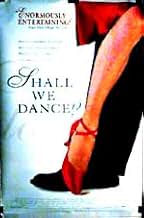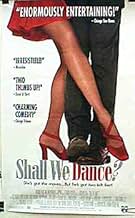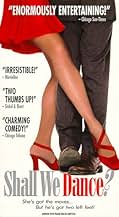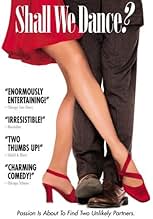IMDb-BEWERTUNG
7,7/10
12.137
IHRE BEWERTUNG
Füge eine Handlung in deiner Sprache hinzuA successful but unhappy Japanese accountant finds the missing passion in his life when he begins to secretly take ballroom dance lessons.A successful but unhappy Japanese accountant finds the missing passion in his life when he begins to secretly take ballroom dance lessons.A successful but unhappy Japanese accountant finds the missing passion in his life when he begins to secretly take ballroom dance lessons.
- Auszeichnungen
- 55 Gewinne & 7 Nominierungen insgesamt
Eri Watanabe
- Toyoko Takahashi
- (as Eriko Watanabe)
Reiko Kusamura
- Tamako Tamura
- (as Raiko Kusamura)
Empfohlene Bewertungen
Okay. As you can see this is one of my favorite if not favorite films. This is a character drama which is absolutely hilarious. The main character is a business man who is stuck in a "same thing, different day" mentality. He sees a woman looking melancholy out a window of a dance studio from his train everyday and wonders about her and decides to find out more about her. He decides to join the dance class only to find out she is not the instructor. From there he bonds with four other dancers and learns to enjoy dancing as well as finding out about the mysterious woman.
There is no gratuitous (or any) sex involved, just how a small group of people learn how friendships are formed and developed.
This film was remade with Richard Gere and Jennifer Lopez and the new one while appealing is nowhere as enjoyable as the original. The movie never made it big in America because it was not eligible for the Oscars since it was broadcast on television in Japan (movies cannot be released on TV or they are disqualified for Oscar nominations). It did win numerous awards in Japan for best film, cast, director etc for their "Oscar" awards.
There is no gratuitous (or any) sex involved, just how a small group of people learn how friendships are formed and developed.
This film was remade with Richard Gere and Jennifer Lopez and the new one while appealing is nowhere as enjoyable as the original. The movie never made it big in America because it was not eligible for the Oscars since it was broadcast on television in Japan (movies cannot be released on TV or they are disqualified for Oscar nominations). It did win numerous awards in Japan for best film, cast, director etc for their "Oscar" awards.
Watched this last night and was bowled over by the heartfelt story line, the excellent character development, and the good karmic vibe emanating from the acting and movie as a whole.
Without giving away too much of the plot, it begins with an ordinary joe who commutes to his office job every day who becomes inspired to take dance lessons. Along the way the protagonist and the assorted characters he meets in his quest to be smooth on the dance floor learn lessons about others and about themselves.
The story has a prologue about what dancing in Japan symbolizes sociologically, so it isn't exactly as simple to learn to dance in Japan as it is here in the U.S.
The film is lighthearted; you'll laugh out loud at some of the sight gags. Yet it is also dignified in a way hard to describe. All of the film's characters are taken seriously, as they are, and none are diminished because of their "imperfections."
I've been thinking about taking social dance classes with some friends. It just so happened a friend lent me the video on learning to dance. Is this synchronous or what? I think so because now I'm really geeked to give it a try.
Watch this wonderful family film (small children might not get it, but teens certainly would) and smile at the genuine caring you see shown in it time and again.
Why they would make a remake of Shall We Dance is a mystery, as it is perfect as-is.
Without giving away too much of the plot, it begins with an ordinary joe who commutes to his office job every day who becomes inspired to take dance lessons. Along the way the protagonist and the assorted characters he meets in his quest to be smooth on the dance floor learn lessons about others and about themselves.
The story has a prologue about what dancing in Japan symbolizes sociologically, so it isn't exactly as simple to learn to dance in Japan as it is here in the U.S.
The film is lighthearted; you'll laugh out loud at some of the sight gags. Yet it is also dignified in a way hard to describe. All of the film's characters are taken seriously, as they are, and none are diminished because of their "imperfections."
I've been thinking about taking social dance classes with some friends. It just so happened a friend lent me the video on learning to dance. Is this synchronous or what? I think so because now I'm really geeked to give it a try.
Watch this wonderful family film (small children might not get it, but teens certainly would) and smile at the genuine caring you see shown in it time and again.
Why they would make a remake of Shall We Dance is a mystery, as it is perfect as-is.
A good movie with an outstanding story. Many assume that the movie is a love story from the typical Hollywood style: boy meets girl love affair. This is not. It is a story of a man who forgot to love life. His everyday life has become routine and he has no idea where his life is taking him. He has a house and car payment and a family of 3 that he has to provide for. From home, he takes his bicycle to the train and then he takes the train to work. Everyday, same old, same old. Then, one day he sees something that turns his world up-side-down. Dancing? A new way to express himself, a way to communicate with others and show his true colors. The passion he finds is not in a woman or mere lust, but in living life to the fullest. He begins to stop and look around him as he uses dancing to live. A terrific cast of funny and heart filled characters. This is not a movie about Japan or the Japanese, although it does take place in Japan and the cast is made up of Japanese. The setting and the plot of this movie is timeless.
A middle-aged accountant in an established, successful Japanese firm has a house, a wife, and a beautiful daughter. He works hard all day, comes home, goes to sleep, and then does the whole thing over again. He's a man who's lost his soul. He's an automaton, a cog in the larger Japanese industrial society. As old Karl Marx would have put it, he's alienated from the larger society of his fellow workers, his family, and from himself. What a predicament.
On the way home from work, he spots a beautiful but melancholy woman looking out the window of a dance studio. Every night, she's there, calling to him like a siren or one of the fabled wood nymphs. There's a sexual attraction that fuels his interest. But there's also much more: he immediately identifies with her, feels an instant sense of connection, because she is outwardly expressing his inner angst. So he takes the leap, overcomes his fear, and signs up for dance lessons.
In the West, this commonplace occurrence would go unnoticed: we would say that Mr. Sugiyama is having a `mid-life crisis.' We would expect him to have an affair with his secretary, or suddenly buy leathers and a Harley and hit the road. But in Japan, where Ballroom dancing is viewed as lascivious, perhaps even perverted behavior, this makes for a much more interesting dilemma. The main character, Mr. Sugiyama, a respectable accountant, is drawn into dance by the alluring siren. He acts on his impulse to get to know her. But then, when reality sets in that he will never win her affection, he falls in love with dance. It becomes his personal means both of self-discovery, and self-expression. It's a fascinating transformation.
One of the reasons that this movie works so well is its rich and varied set of characters, all of which are simply adorable. This is an incredibly impressive Japanese film. It's a must-see video.
On the way home from work, he spots a beautiful but melancholy woman looking out the window of a dance studio. Every night, she's there, calling to him like a siren or one of the fabled wood nymphs. There's a sexual attraction that fuels his interest. But there's also much more: he immediately identifies with her, feels an instant sense of connection, because she is outwardly expressing his inner angst. So he takes the leap, overcomes his fear, and signs up for dance lessons.
In the West, this commonplace occurrence would go unnoticed: we would say that Mr. Sugiyama is having a `mid-life crisis.' We would expect him to have an affair with his secretary, or suddenly buy leathers and a Harley and hit the road. But in Japan, where Ballroom dancing is viewed as lascivious, perhaps even perverted behavior, this makes for a much more interesting dilemma. The main character, Mr. Sugiyama, a respectable accountant, is drawn into dance by the alluring siren. He acts on his impulse to get to know her. But then, when reality sets in that he will never win her affection, he falls in love with dance. It becomes his personal means both of self-discovery, and self-expression. It's a fascinating transformation.
One of the reasons that this movie works so well is its rich and varied set of characters, all of which are simply adorable. This is an incredibly impressive Japanese film. It's a must-see video.
This movie opened in Korea four years later than in Japan due to the now-defunct ban on Japanese pop culture in Korea. But the audiences in Korea were just as enthralled and enchanted by the story as the rest of the world was.
Like Japan, there are many salarymen in Korea who are also facing a mid-life crisis. After the movie premiered in Seoul, dance studios were reporting up to a 50-percent increase in the number of new students.
I took two years of jazz dance during college, and have seen Strictly Ballroom and Dance With Me. But this movie was the driving force behind me finally signing up for ballroom dance (called dancesport in Korea) lessons.
Mr. Aoki was hilarious as the employee who led a double life unbeknownst to his colleagues. It was also interesting to find out the reasons why the other students took lessons.
I too would have taken classes just to get close to the sexy dance instructor alone.
This movie is a perfect ten in my book.
Like Japan, there are many salarymen in Korea who are also facing a mid-life crisis. After the movie premiered in Seoul, dance studios were reporting up to a 50-percent increase in the number of new students.
I took two years of jazz dance during college, and have seen Strictly Ballroom and Dance With Me. But this movie was the driving force behind me finally signing up for ballroom dance (called dancesport in Korea) lessons.
Mr. Aoki was hilarious as the employee who led a double life unbeknownst to his colleagues. It was also interesting to find out the reasons why the other students took lessons.
I too would have taken classes just to get close to the sexy dance instructor alone.
This movie is a perfect ten in my book.
Wusstest du schon
- WissenswertesIn the first scene, a man's shoe in close-up plunges into a black pool in the street. This symbolizes the world renowned Ballroom Dancing Competition in Blackpool, England, referenced later in the film.
- Zitate
Shohei Sugiyama: At my age, it's embarrassing to say so, but every day I feel so alive.
- Alternative VersionenOriginal Japanese version (pre-Miramax) runs 136 minutes and is available on Hong Kong laseridisc with English and Chinese subtitles.
Top-Auswahl
Melde dich zum Bewerten an und greife auf die Watchlist für personalisierte Empfehlungen zu.
- How long is Shall We Dance??Powered by Alexa
Details
Box Office
- Bruttoertrag in den USA und Kanada
- 9.601.627 $
- Eröffnungswochenende in den USA und in Kanada
- 12.606 $
- 1. Juni 2025
- Weltweiter Bruttoertrag
- 9.601.627 $
Zu dieser Seite beitragen
Bearbeitung vorschlagen oder fehlenden Inhalt hinzufügen















